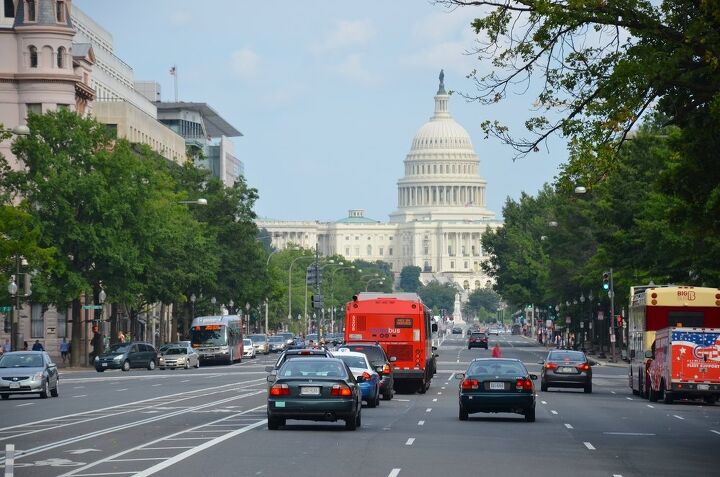#GasWar
Four Automakers Make a Deal With California Regarding Vehicle Emissions
While we’ve dinged the media for erroneously reporting that automakers were unilaterally “backing” California in the fuel-economy fracas that’s currently taking place within American politics, it appears four of them actually are starting to choose a side. However, this again requires a bunch of clarification. Despite not adhering fully to the state’s ideal emissions scenario, Ford Motor Co., BMW Group, Volkswagen Group, and Honda Motor Co. released a joint announcement stating they have reached a voluntary agreement with the state of California to adopt compromised vehicle emissions rules.
Since there’s nothing binding in the joint agreement and automakers make (and break) promises all the time, the deal is largely meaningless. Doubly so, since the fuel-economy rollbacks have yet to be finalized. But this does illustrate how a handful of manufacturers are willing to accommodate others in order to get a nationwide solution. It also shows a softening of California’s previously ironclad environmental stance, which is much more interesting.
Mild Misinformation About the Gas War: Governors Unite, Automakers Compromise
On Tuesday, 23 governors signed a joint statement urging the Trump administration to reconsider the proposed rollback of Obama-era fueling regulations. Led, unsurprisingly, by California Governor Gavin Newsom, the letter suggests a “common-sense approach” to national requirements with an emphasis on rising standards.
A minor update in the gas war to be certain — and yet annoyingly framed by a large portion of the media as a victory for California when the realities are far more complicated. To be frank, we’re getting pretty tired of these lopsided takes. This whole thing is a regulatory and political quagmire… on all sides.
Gas War Watch: Canada Sides With California
Canada’s federal government announced it has signed a memorandum of understanding with California to further reduce vehicle emissions. It would appear that the United States’ neighbor to the north has chosen a side in the gas war — at least spiritually.
Canadian Environment Minister Catherine McKenna, along with California Governor Gavin Newsom, announced the agreement’s signing on Wednesday.
“As the world’s fifth-largest economy and a global leader in clean transportation, California is a leading example of how climate action can be good for people, the environment and the economy,” McKenna said. “We look forward to working with California to fight climate change, keep the air clean and give drivers better options for cleaner, more affordable vehicles.”
Gas War Watch: EPA and CARB Leadership Won't Even Share the Same Table
Capitol Hill was the scene of some high-school drama this week after representatives from the Environmental Protection Agency (EPA) and the California Air Resources Board (CARB) reportedly refused to sit at the same table while discussing fueling regulations with the U.S. House Energy and Commerce Committee.
As petty as this seems, it illustrates the overall situation rather well. White House officials terminated talks with California in February, citing an inability to progress the debate. Meanwhile, CARB has been claiming the Trump administration doesn’t want to hear its case and has instead sought to strip the state of its ability to self regulate in order to pass reforms that would freeze national emissions standards at 2020 levels though 2026.
Thursday’s congressional bickering helped paint a clearer picture of what the communications breakdown looked like.
Gas War Watch: UAW Goes to Congress, Sides With Automakers on Fuel Economy Rollback
The United Auto Workers is spending Thursday telling Congress that the union opposes the Trump administration’s proposal to freeze fuel efficiency requirements at 2020 levels through 2026… sort of. While the UAW expressed moderate environmental concerns in the past, most of its opposition to the rollback has revolved around corporate investments into the industry. In fact, the union’s research arm called fuel economy the auto industry’s “future” in 2018.
This time around, the UAW seems to be singularly focused on business aspects. According to a prewritten testimony, UAW Legislative Director Josh Nassar intends to tell two subcommittees of the U.S. House Energy and Commerce Committee that the union is in line with automakers’ concerns about the proposal leading to “protracted litigation and uncertainty in the industry that will limit growth.”
The Great Gas War: House Committee Plans Hearing On Fuel Efficiency Rollback
On Tuesday, the House of Representatives Energy and Commerce Committee said it will schedule a hearing on June 20th regarding the Trump administration’s proposal to roll back automotive efficiency standards. The decision comes from Committee Chairman Frank Pallone, Jr. (D-NJ), Consumer Protection and Commerce Subcommittee Chair Jan Schakowsky (D-IL) and Environment and Climate Change Chairman Paul Tonko (D-NY) — all of whom are in clear opposition to the suggested plan.
The groups will hold a joint hearing to discuss Corporate Average Fuel Economy (CAFE) standards and carbon pollution regulations affecting light duty vehicles as they relate to the current administration’s plan to effectively freeze efficiency targets between 2020 to 2026.
Meet Us in the Middle: Automakers Plead for Peace, Compromise Between White House and California
The automotive industry is in turmoil. There’s an industrywide push toward electrification that has yet to prove itself as truly profitable, volume seems to be tapering off in the developed world, and emissions regulations aimed at improving air quality are operating counter to existing consumer tastes. As a result, automakers are scrambling to find the best path forward.
In 2017, that path involved encouraging the new U.S. president to roll back Obama-era fuel economy mandates, thus providing some breathing room and staving off fines as automakers began to realize they wouldn’t be able to meet tightening targets. The administration listened, leading to a proposal that would effectively freeze mileage standards at about 37 miles per gallon — rather than the previously decided 54.5 mpg — by 2025.
However, California and a coalition of supportive states claim they won’t be going along for the ride. This group says it will maintain the old standards, regardless of what the White House says. The staredown has automakers worried; they’ve now banded together to issue a letter asking both sides to calm down and keep talking.
White House to Automakers: Choose a Side in the Great Gas War
The Trump administration has long been at odds with California and a coalition of supportive states that hope to block the rollback of Obama-era fueling regulations the current Environmental Protection Agency deems “unsustainable.” The EPA also says it’s inconsistent with consumer behavior. But automakers have behaved somewhat erratically on the matter, forcing the president to request (by proxy) that they make up their minds and pick a side before a final decision is made.
While industry leaders previously backed the more stringent regulatory framework set in place by the former president, they quickly converged on Washington after Trump assumed office in 2017, requesting a softening of Corporate Average Fuel Economy standards. After blowback from California and environmental activists, automakers took a more measured approach, publicly stating that they support green initiatives and reducing their own carbon footprint — and suggesting that a national deal be reached that pleases all parties.
Fence-sitting time might be over.
Lawmakers Demand MPG Details, States File Lawsuit Against EPA
America’s gas war is heating after 17 states, as well as the District of Columbia, filed a lawsuit against the Environmental Protection Agency’s decision to redefine U.S. vehicle emissions and fuel efficiency rules through 2025.
In April, EPA chief Scott Pruitt said the existing standards for model year 2022 to 2025 vehicles should be revised. The suit, filed in the U.S. Court of Appeals for the District of Columbia, alleges the EPA acted unpredictably, failed to follow its own regulations, and was in direct violation of the Clean Air Act. New York Attorney General Eric Schneiderman claimed the “Trump administration conducted a phony study” to justify altering emission rules to appease automakers and the oil industry.
Meanwhile, U.S. Representatives Doris Matsui of California and Paul Tonko of New York are demanding the EPA hand over all documents related to the study that resulted in the proposed changes to fuel economy standards.























Recent Comments